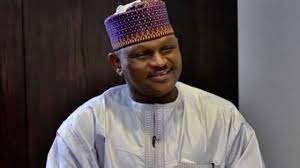2023 ELECTION - CANDIDATE AND ELECTORAL FINANCING METHODS

Hamza Al-Mustapha 
62years | Yobe State | AA
Aspiring for President - Federal Republic of Nigeria
Hamza Al-Mustapha (born 27 July 1960) is a former Nigerian Army major and intelligence officer who served as Chief Security Officer to General Sani Abacha, who was Nigeria's military head of state from 1993 until his sudden death on June 8, 1998. Hamza Al-Mustapha was born and educated in Nguru. He enrolled at the Nigerian Defence Academy in Kaduna and was commissioned into the Nigerian Army in 1983.
From August 1985 to August 1990, Al-Mustapha was [Aide-de-camp] (ADC) (but recently clarified in an open television interview with Channels Television's Seun Okinbaloye that he wasn't ADC that he was the Chief Security Officer) to [Chief of Army Staff (Nigeria)|Chief of Army Staff], General [Sani Abacha]. Both his principal and head of state, General [Ibrahim Babangida] had absolute confidence in his abilities, and entrusted him with exceptional powers, considerably greater than other officers who were nominally his superior. This further projected him as a strongman of the military hierarchy.
Al-Mustapha was trained as a military intelligence operative. He held various command posts in the Ministry of Internal Affairs, Security Group of the Directorate of Military Intelligence (SG-DMI), 82 Division and Army Headquarters; Ministry of Defence and The Presidency.
He was also involved in counter-intelligence activities and at least two investigations of coup attempts; which brought him to the attention of General Sani Abacha. He also conducted operations in Chad, Liberia, Bakassi, Gambia and Sierra Leone.
General Sani Abacha died on 8 June 1998, following his death al-Mustapha assembled the military hierarchy in order to avoid a succession crisis. General Abdulsalam Abubakar emerged as head of state on 9 June 1998 and al-Mustapha was removed from office and subsequently arrested.
Following his arrest, al-Mustapha was first held and questioned during the Oputa panel, then accused of plotting at least four coups from prison, before being moved to the Kirikiri Maximum Security Prison, where he was tortured for over a year. He was in chains and solitary confinement for over a year, allowed only a cup of water daily and subject to psychological torture. His private residences in Abuja, Kano and Yobe were looted by government operatives, his children's toys were burned in front of him to instil fear, his family was subject to numerous threats, and throughout his internment he was allowed to see his parents only twice - who later died. In May 2011, there were rumours that al-Mustapha had been murdered at the Kirikiri Maximum Security Prisons where he was being held, but these turned out to be untrue.
In 2007, there were appeals for al Mustapha's release including from former military president Ibrahim Babangida. On 21 December 2010, al-Mustapha and his co-defendants were acquitted of most charges. However, al-Mustapha was still not cleared of the alleged murder of Kudirat Abiola. In July 2011, the case was reopened. Hamza Al-Mustapha and his co-accused Lateef Sofolahan testified to their innocence of the murder charges. On 30 January 2012, the Lagos High Court subsequently found al-Mustapha guilty of the murder and he was sentenced to death by hanging. On 12 July 2013, The Court of Appeal in Lagos overturned the high court judgement and acquitted al-Mustapha of all murder charges of Kudirat Abiola. During the fifteen year trial, al-Mustapha appeared before thirteen different judges and two magistrates.
Details
